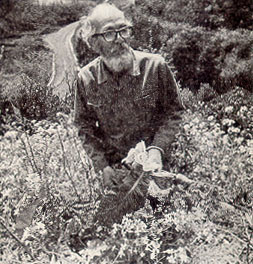

![]()
"I believe that a revolution can begin from this one strand of straw. Seen at a glance,
this rice straw may appear light and insignificant. Hardly anyone would believe that it could start a revolution.
But I have come to realize the weight and power of this straw. For me, this revolution is very real."
--- Masanobu Fukuoka, The One Straw Revolution
Mansanobu Fukuoka began his mission to revolutionize the world of agriculture after a career as a research
scientist for the Yokohama Custums Bureau. His job was to isolate and analyze various insect pests which damaged
the rice crop. Fukuoka became disillusioned with this scientific life after several bouts with exhaustion and illness.
He came to realize that "In this world there is nothing...I could see that all the concepts to which I had
been clinging, the very notion of existence itself, were empty fabrications" (8).
Fukuoka then moved back to his father's tangerine orchard in the country. It was here that his philosophy of "do
nothing farming" matured. This style of agriculture runs into conflict with modern agriculture which asks
"How about trying this or that?" and which "brings in a variety of techniques, one on top of the
other" (15). Fukuoka's method asks "How about not doing this? How about not doing that?" (15). It
is a progression towards nature and a simplification of agriculture which limits our involvement in the natural
cycle. Not only does this method help the earth to sustain its natural populations, but Fukuoka believed it is
also economically superior to the modern method.
Fukuoka's emphasis is on the return to nature. For the farmer, this involves leaving behind the scientific world
of fertilizer, tilling and pesticides for a more natural, sustainable farm which capitalizes on the cooperative
behavior of plants, soil and all other life forms.
![]()